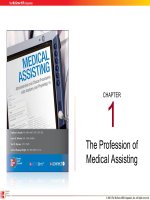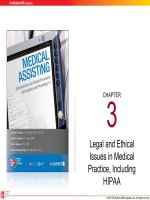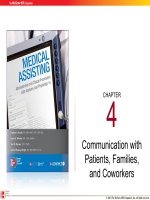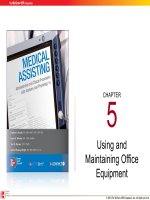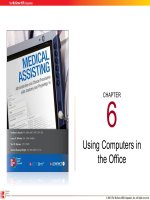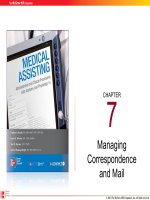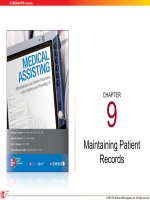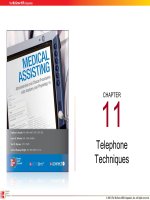Lecture Medical assisting: Administrative and clinical procedures with anatomy and physiology (4e) – Chapter 3
Bạn đang xem bản rút gọn của tài liệu. Xem và tải ngay bản đầy đủ của tài liệu tại đây (1.14 MB, 70 trang )
CHAPTER
3
Legal and Ethical
Issues in Medical
Practice, Including
HIPAA
© 2011 T he McGraw -Hill Com panie s, Inc. A ll rights reserv ed.
3-2
Learning Outcomes
3.1 Define ethics, bioethics, and medical law.
3.2 Discuss the measures a medical practice
must take to avoid malpractice claims.
3.3 Discuss medical documentation and how
it applies to medical law.
© 2011 T he McGraw -Hill Com panie s, Inc. A ll rights reserv ed.
3-3
Learning Outcomes (cont.)
3.4 Discuss the various types of health-care
legislation.
3.5 Describe OSHA requirements for a
medical office.
3.6 Describe procedures for handling an
incident of exposure to hazardous
materials.
© 2011 T he McGraw -Hill Com panie s, Inc. A ll rights reserv ed.
3-4
Learning Outcomes (cont.)
3.7 Compare and contrast quality control and
quality assurance procedures.
3.8 Discuss the impact that HIPAA regulations
have in the medical office.
3.9 Explain how to protect patient
confidentiality.
3.10 Describe the different practice
management models.
© 2011 T he McGraw -Hill Com panie s, Inc. A ll rights reserv ed.
3-5
Introduction
• Reasons to study medical
law and ethics
– Function at the highest
professional level
– Avoid legal problems
© 2011 T he McGraw -Hill Com panie s, Inc. A ll rights reserv ed.
3-6
Medical Law and Ethics
• Knowledge of medical law and ethics provides
insight into
– The rights, responsibilities, and concerns of
health-care consumers
– The legal and ethical issues facing society,
patients, and health-care professionals as the
world changes
– The impact of rising costs on the laws and ethics
of health-care delivery
© 2011 T he McGraw -Hill Com panie s, Inc. A ll rights reserv ed.
3-7
Medical Law and Ethics (cont.)
A law is a rule of conduct
or action prescribed or
formally recognized as
binding or enforced by a
controlling authority.
Ethics is a standard of
behavior and a concept
of right or wrong.
Moral values serve as
the basis for ethical
conduct.
Family, culture, and
society help form an
individual’s moral
values.
© 2011 T he McGraw -Hill Com panie s, Inc. A ll rights reserv ed.
3-8
Medical Law and Ethics (cont.)
• Criminal law
– Crime against the
state
– Criminal acts are
• Felonies or
• Misdemeanors
– Examples include:
•
•
•
•
Murder
Arson
Sexual assault
Burglary
• Civil law
– Crimes against the
person
– Includes a general
category of laws
known as torts
– Torts are either:
• Intentional (willful) or
• Unintentional
(accidental)
© 2011 T he McGraw -Hill Com panie s, Inc. A ll rights reserv ed.
3-9
Intentional Torts
Assault
Open threat of bodily
harm
Battery
An action that causes
bodily harm to another,
including touching
without permission
Fraud
Depriving or attempting to
deprive a person of his
or her rights
Invasion of privacy
Interference with a person’s
right to be left alone
Defamation of character
Damaging a person’s reputation
by making false and malicious public
statements
False imprisonment
Intentional, unlawful restraint or
confinement of a person
© 2011 T he McGraw -Hill Com panie s, Inc. A ll rights reserv ed.
3-10
Unintentional Torts
Acts that are committed with no intent to
cause harm but done with a disregard for the
consequences
The term negligence is used to describe such
actions when health-care practitioners fail to
exercise ordinary care, resulting in patient injury
Malpractice is the negligent delivery of
professional services
© 2011 T he McGraw -Hill Com panie s, Inc. A ll rights reserv ed.
3-11
Contracts
A contract is a voluntary agreement between two
parties in which specific promises are made for a
consideration.
Elements of a Contract
Agreement
Contractual Capacity
Consideration
Legal Subject Matter
© 2011 T he McGraw -Hill Com panie s, Inc. A ll rights reserv ed.
3-12
Types of Contracts
• Expressed contracts
– Clearly stated in written or spoken words
– An example is a payment contract
• Implied contracts
– Actions or conduct of the parties, rather
than words, create the contract
– An example is a patient rolling up his or
her sleeve to receive an injection
© 2011 T he McGraw -Hill Com panie s, Inc. A ll rights reserv ed.
3-13
Apply Your Knowledge
What is the difference between law and
ethics?
ANSWER: A law is a rule of conduct or action and is
enacted by governments to maintain order and public
safety.
Ethics is a standard of behavior based on moral
values that are influenced by family, culture, and
society.
© 2011 T he McGraw -Hill Com panie s, Inc. A ll rights reserv ed.
3-14
Physician/Patient Contract
• Reasonable
limitations
• Both parties have
rights and
responsibilities
related to the contract
© 2011 T he McGraw -Hill Com panie s, Inc. A ll rights reserv ed.
3-15
Physician Rights
• Set up a practice within
the boundaries of his or
her license to practice
medicine
• Select where to set up an
office and establish office
hours
• Specialize
• Decide which services to
provide and how those
services will be provided
© 2011 T he McGraw -Hill Com panie s, Inc. A ll rights reserv ed.
3-16
Physician Responsibilities
• Physician responsibilities
– Use due care, skill, judgment, and diligence
– Keep knowledge up-to-date
– Perform to the best of his or her ability
– Furnish complete information and instructions to
the patient
© 2011 T he McGraw -Hill Com panie s, Inc. A ll rights reserv ed.
3-17
Patient Rights/Responsibilities
• Patient responsibilities
– Follow physician’s
instructions and
cooperate with care
– Provide relevant
information to the
physician
– Follow the physician’s
orders for treatment
– Pay the fees charged for
services provided
© 2011 T he McGraw -Hill Com panie s, Inc. A ll rights reserv ed.
3-18
Patient-Physician Contract (cont.)
• Liability
– Legal responsibility
for actions
• Understand scope of
practice
• Understand standard of
care and duty of care
– Medical assistants
are all held to the
“reasonable person
standard”
• Consent
– Implied – actions
imply permission
– Informed
• Patient receives all
information necessary
to make a decision
regarding treatment
• Doctrine of informed
consent – legal basis
for informed consent
© 2011 T he McGraw -Hill Com panie s, Inc. A ll rights reserv ed.
3-19
Special Circumstances – Closing of a Practice
• Comply with HIPAA
• Notify patients in writing
• Give option of choosing another physician or make
referral
• Secure or dispose of records appropriately
• Remain up-to-date on HIPAA laws
© 2011 T he McGraw -Hill Com panie s, Inc. A ll rights reserv ed.
3-20
Apply Your Knowledge
Patients have rights and responsibilities relating to health
care. The rights are determined by the Patient Care
Partnership. What are the patient’s responsibilities?
ANSWER: Patient responsibilities are:
– Follow physician’s instructions and cooperate with
plan of care
– Provide relevant information to the physician
– Follow the physician’s orders for treatment
– Pay the fees charged for services provided
© 2011 T he McGraw -Hill Com panie s, Inc. A ll rights reserv ed.
3-21
Preventing Lawsuits
• Lawsuits
– Add to cost of health care
– Take a psychological toll on
all
involved
• Prevention
– Use of reasonable care to
prevent professional liability
© 2011 T he McGraw -Hill Com panie s, Inc. A ll rights reserv ed.
3-22
Malpractice
• Malpractice claims are lawsuits by a patient
against a physician for errors in diagnosis or
treatment
– Examples: post-operative complications, Res ipsa
loquitur (the thing speaks for itself)
• Negligence cases are those in which a person
believes a medical professional’s actions, or lack
thereof, caused harm to the patient
– Examples: abandonment, delayed treatment
© 2011 T he McGraw -Hill Com panie s, Inc. A ll rights reserv ed.
3-23
Malpractice (cont.)
© 2011 T he McGraw -Hill Com panie s, Inc. A ll rights reserv ed.
3-24
The 4 Ds of Negligence
uty
Patients must show that a physician-patient relationship
existed.
erelict
Patients must show that the physician failed to
comply with the standards of the profession.
irect Cause
Patients must show that any damages were a
direct cause of a physician’s breach of duty.
amages Patients must prove that they suffered injury.
Patients must be able to prove all 4 Ds in order
to move forward with a malpractice suit.
© 2011 T he McGraw -Hill Com panie s, Inc. A ll rights reserv ed.
3-25
Malpractice (cont.)
• Civil law
– Concerned with an
individual’s private
rights
• Settling malpractice suits
– Arbitration
• People with special
knowledge in the field listen
to the case and decide the
dispute
– Torts
• Negligence
• Breach of contract
– Failure to adhere to
a contract’s terms
– Court
• Written court orders
(subpoena) are delivered
to involved parties.
• Subpoena duces tecum is
a court order to produce
documents such as patient
records
© 2011 T he McGraw -Hill Com panie s, Inc. A ll rights reserv ed.
